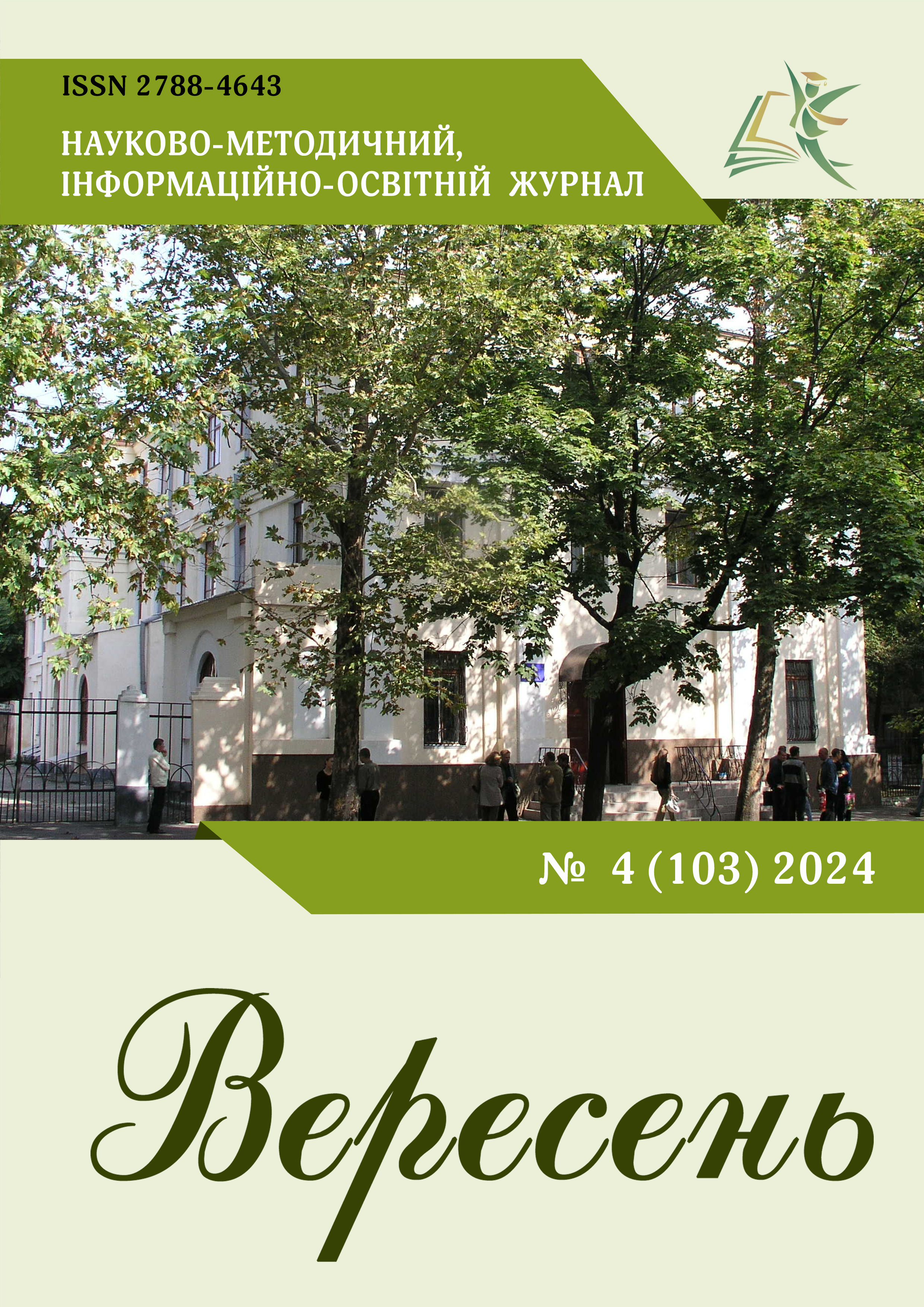IMPLEMENTING STEM-BASED CHEMISTRY PROJECTS
DOI:
https://doi.org/10.54662/veresen.4.2024.07Keywords:
STEM-education, natural sciences, project-based learning, key competencies, essential skillsAbstract
The scientific-methodological article examines the theoretical foundations and practical aspects of subject integration within STEM education, particularly in chemistry lessons. It provides an analysis of the components of an integrated approach, highlighting interdisciplinarity, contextualization, cooperative learning, active learning, individualization, technological support, and the coherence of learning objectives. The significance of interdisciplinarity is emphasized, combining the knowledge from natural sciences, engineering, technology, and mathematics to encourage active cognitive engagement and critical thinking in students. The paper emphasizes the advantages of integrating the STEM approach, enabling the combination of chemistry with other sciences such as physics, biology, and mathematics. The author analyzes the effectiveness of implementing STEM projects in the chemistry curriculum. The specific STEM project example is presented as «Exploring the feasibility of using vegetable soaking as a method to reduce nitrate levels in vegetables» in the article, outlining an interdisciplinary approach to teaching chemistry and demonstrating the integration of chemistry with knowledge from physics, biology, and mathematics. The proposed use of artificial intelligence tools at the preparatory stage is noted, facilitating result prediction and method selection. The provided example illustrates that such an approach enables students not only to acquire theoretical knowledge, but also to apply it in practical situations, developing problem-solving skills in real-world contexts. The STEM approach is emphasized as a means of fostering systems of thinking and interdisciplinary connections among students. Through integrating chemistry with other disciplines, children can gain insights into the real-life applications of chemical knowledge, enhancing their understanding of fundamental chemical processes and principles. STEM education improves learning outcomes and prepares students for future challenges in a modern world where interdisciplinary skills are increasingly in demand. Implementing STEM projects supports not only scientific knowledge development, but also the formation of key competencies and essential skills necessary for further academic and professional success.
The author sequentially describes the stages of implementing the STEM project on «Investigation of the Feasibility of Using the Soaking Method to Reduce Nitrate Levels in Vegetables», as well as provides quantitative analysis methods for determining nitrate ions (NO3-), and presents an example of an instruction card. The article demonstrates the integration of chemistry with biology, physics, mathematics, and other sciences. Within chemistry, students study the chemical properties of salts and their impact on human health; biology examines the effect of nitrates on the body; mathematics is used for calculations; and computer science aids in data analysis and diagram creation.
References
Buturlina, O.V., Dovhal, S. A., Hryhorov, H. A., Lysokolenko, T. V. & Palahuta, V. I. (2021). STEM-osvita v Ukraini v konteksti staloho rozvytku [STEM education in Ukraine in the context of sustainable development]. Yevropeiskyi zhurnal staloho rozvytku, 10 (1), 323–328. DOI: https://doi.org/10.14207/ejsd.2021.v10n1p323 (ukr).
Concept of Development of Natural Science and Mathematical Education (STEM Education). Retrieved from: https://zakon.rada.gov.ua/laws/show/960-2020-%D1%80#Text (ukr).
Korshevniuk, T. V. & Yaroshenko, O. H. (2022). Osoblyvosti konstruiuvannia prohramy intehrovanoho kursu «Piznaiemo pryrodu» dlia uchniv 5–6 [Features of designing the program of the integrated course «Learning about Nature» for students in grades 5–6]. Pidhotovka maibutnikh uchyteliv fizyky, khimii, biolohii ta pryrodnychykh nauk u konteksti vymoh Novoi ukrainskoi shkoly. Ternopil, 293–295 (ukr).
Matskiv, I. I. (2017). Uprovadzhennia elementiv STEM-osvity v navchalnyi protses pid chas vyvchennia khimii ta biolohii [Introduction of elements of STEM education into the educational process during the study of chemistry and biology]. Tavriiskyi visnyk osvity, 3, 74–82 (ukr).
Matviichuk, Yu. Yu. (2021). STEM-osvita yak instrument realizatsii intehrovanoho vyvchennia pryrodnycho-matematychnykh dystsyplin [STEM education as a tool for implementing the integrated study of natural and mathematical disciplines]. Teoriia ta metodyka navchannia ta vykhovannia, 50, 123–135 (ukr).
Mintii, M. M. (2023). Vyvchennia landshaftu STEM-osvity ta pidhotovky personalu: kompleksnyi systematychnyi ohliad [Studying the landscape of STEM education and personnel training: a comprehensive systematic review]. Osvitnii vymir [onlain], 9, 149–172. DOI: https://doi.org/10.31812/ed.583 (ukr).
Myronchuk, O. P., Trofimuk, M. B. & Kashcheniuk, M. R. (2019). Binarni uroky yak forma STEM-oriientovanoi orhanizatsii osvitnoho protsesu [Binary lessons as a form of STEM-oriented organization of the educational process]. Pedahohichnyi poshuk, 4, 57–61 (ukr).
Myronenko, I. V. (2023). Uprovadzhennia metodu proiektiv yak zasobu realizatsii diialnisnoho pidkhodu v osvitnomu protsesi z biolohii [Implementation of the project method as a means of implementing the activity approach in the educational process in biology]. Veresen, 3 (98), 48–59. DOI: https://doi.org/10.54662/veresen.3.2023.04 (ukr).
Pohromska, H. S., Makhrovska, N. A., & Rohozhynska, E. K. (2022). Relevantnist matematychnoi osvity v synerhii skladnykiv STEM [The relevance of mathematics education in the synergy of STEM components]. Veresen, 3 (94), 17–28. DOI: https://doi.org/10.54662/veresen.3.2022.03 (ukr).
Polikhun, N. I., Postova, K. H., Slipukhina, I. A., Onopchenko, H. V. & Onopchenko, O. V. (2019). Uprovadzhennia STEM-osvity v umovakh intehratsii formalnoi i neformalnoi osvity obdarovanykh uchniv [Implementation of STEM education in conditions of integration of formal and informal education of gifted students]. Kyiv: Instytut obdarovanoi dytyny NAPN Ukrainy (ukr).
Shapovalov, Ye. V. (2021). Problema vyznachennia STEM-osvity ta mizhdystsyplinarnosti [The problem of defining STEM education and interdisciplinarity]. Aktualni aspekty rozvytku STEM-osvity u navchanni pryrodnycho-naukovykh dystsyplin, 237–240 (ukr).
Smith, K., Maynard, N., Berry, A., Stephenson, T., Spiteri, T., Corrigan, D., Mansfield, J. & at all. (2022). Principles of Problem-Based Learning (PBL) in STEM Education: Using Expert Wisdom and Research to Frame Educational Practice. Education Sciences, 12, 728. DOI: https://doi.org/10.3390/educsci12100728 (eng).
Velychko, N. S. & Vyshnevska, N. S. (2023). Intehrovana systema navchannia khimii u konteksti kompetentnisnoho pidkhodu [An integrated system of teaching chemistry in the context of the competence approach]. Scientific opinions on modern methods of solving problems. Praha, 143–149 (ukr).
Zasiekina, T. M. (2020). Intehratsiia v shkilnii pryrodnychii osviti: teoriia i praktyka [Integration in school science education: theory and practice]. Kyiv: Pedahohichna dumka (ukr).




